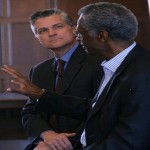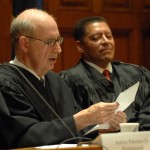2010 Jenkins Competition Winners
Please congratulate the winners of the 2010 Jenkins Honors Moot Court Competition, Gabe Johnson-Karp and Alexandra Grimley. Congratulations also go to Emily Lonergan and Ashley Roth as finalists.
Gabe and Alexandra received the Franz C. Eschweiler Prize for Best Brief. Emily Lonergan received the Ramon A. Klitzke Prize for Best Oral Advocate.
Special thanks to the judges of the final round: the Honorable Jeffrey S. Sutton, the Honorable Diane S. Sykes, and the Honorable Charles N. Clevert.
We are also very grateful for the assistance of the semifinal round judges: the Honorable Mel Flanagan, the Honorable Jeffrey A. Kremers, the Honorable Dennis P. Moroney, the Honorable William S. Pocan, the Honorable Bruce E. Schroeder, and the Honorable Mary K. Wagner.
Finally, thank you to the numerous preliminary round judges and brief graders who are listed on the Law School’s website. The time and support of all of our judges is greatly appreciated.


